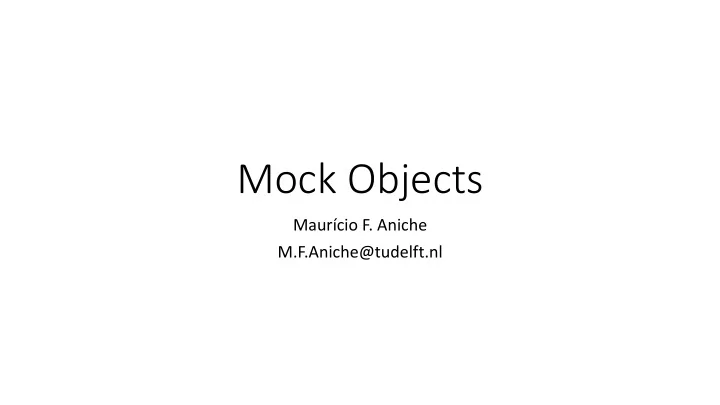

Mock Objects Maurício F. Aniche M.F.Aniche@tudelft.nl
That’s how it is in OO systems… A does too much! A
That’s how it is in OO systems… A does too much again! A C
That’s how it is in OO systems… etc B A DB C
What should we do to test a class without its dependencies? How to write unit tests for A? etc B A DB C
We simulate the dependencies! • Fast • Full control B’ and C’ are (lightweight) B’ simulations of B and C, respectively. A C’
Mock k Objects mock objects are objects that mimic the behavior of real objects/dependencies, easing their controllability and observability.
Why do I want to control my dependencies? • To easily simulate exceptions • To easily simulate database access • To easily simulate the interaction with any other infrastructure • To avoid building complex objects • To control third-party libraries that I do not own etc B A DB C
Let’s code! I wanna filter all the invoices where their value are smaller than 100.0. Invoices come from the database. Code: https://gist.github.com/mauricioaniche/03ee12e64d734e7ea370eceb68fe6676
To mock or not to mock? • Developers have mixed feelings about the usage of mock objects. • Can you see the advantages and the disadvantages of using mocks? • Adv: Easy to control dependencies, easy to automate test cases. • Disadv: Not very real, integration problems might pass. • At the end of the day, it’s about using the right tool at the right moment.
DATABASE 72%(167) 28%(64) WEB SERVICE 69%(182) 31%(82) EXTERNAL 68%(140) 32%(67) DEPENDENCIES DOMAIN OBJECT 36%(319) 64%(579) 7% JAVA LIBRARIES (12) 93%(160) TEST SUPPORT 6% 94%(358) Percentage of mocked dependencies Percentage of non-mocked dependencies
When to mock? • We empirically see that infrastructure is often mocked. • There was no clear trend on domain objects. • Their practice: Complicated/complex classes are mocked. • No mocks for libraries (e.g., lists or small util methods).
Mocks are introduced from the very beginning of the test class!
50% of changes in a mock occur because the production code changed! Coupling is strong!
No single metric explains why a class is mocked.
Developers are Davide Spadini, M. Finavaro Aniche, Magiel Bruntink, Alberto Bacchelli. To Mock or Not To Mock? An Empirical Study on Mocking Practices. MSR 2017. Mock Objects For Testing Java Systems: Why and How Developers Use Them, and How aware of the They Evolve. EMSE, 2018. trade-offs! • They mock databases, but then later write integration tests. • Added “complexity” in exchange of testability. • They understand how coupled they are when they use mocks.
Let’s code! The remaining invoices should be sent to our Webservice!
Solution • Final implementation: https://gist.github.com/mauricioaniche/ca143c74f7a788e7e42644af74b472de
Recommend
More recommend